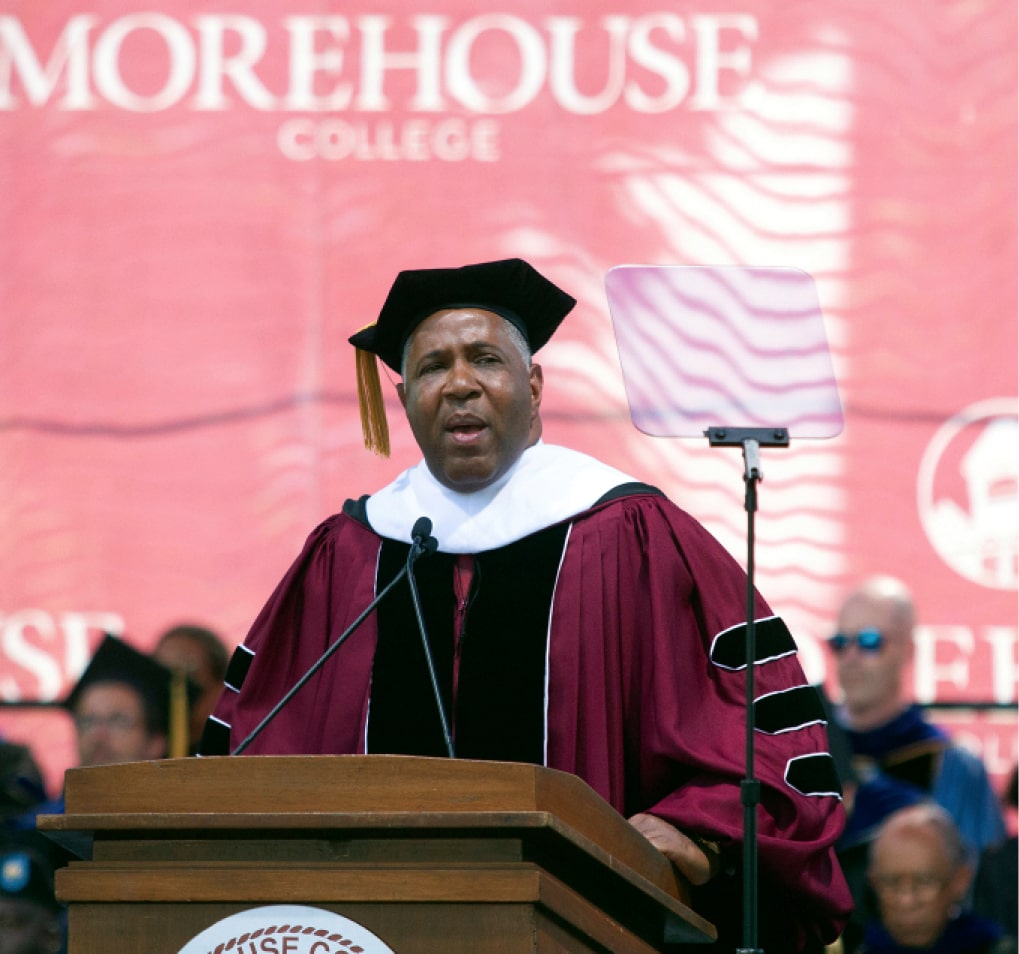According to a 2021 report from the U.S. Department of Education, 42.9 million Americans have federal student loans. That’s 1 in 8 Americans. Furthermore, the current total outstanding student loan debt is $1.59 trillion, with most students leaving college saddled with nearly $30,000 in personal debt. However, there is one group of students that is, proportionally, accruing more student debt than others — African American students — and to a greater degree — African American students at Historically Black Colleges and Universities (HBCUs).
African American students typically graduate with, on average, $7,400 more in debt than their white peers. Students at HBCUs fare even worse. According to the United Negro College Fund (UNCF), 80% of the students from HBCUs fund their education through federal loans compared to the 55% at non-HBCUs. They also borrow thousands of dollars more, with 25% of students borrowing $40,000 or more compared to only 6% of students at non-HBCUs.
The Effects of Decreased Enrollment on HBCUs
With the high loan debt that awaits African American students who attend HBCUs, let alone other universities or colleges, it should come as no surprise that HBCUs are suffering from decreased enrollment. During the 2018-19 academic year, 6,000 fewer students attended HBCUs, with some of 100 or so universities and colleges experiencing even worse enrollment drops. Cheyney University, for example, founded in 1837 as the first HBCU, lost 38% of its student body, while Bethune-Cookman College’s enrollment has dropped by 20%.
While a decrease in the student body of these institutions is an evident loss for the universities, the loss of any of these already limited number of HBCUs would be catastrophic for the African American community. For example, the 100 or so HBCUs in operation today together produce approximately 50,000 graduates annually, as well as:
- 14% of the total number of African American college graduate degrees
- 25% of African American STEM bachelor’s degrees
- 50% of African American teaching degrees
- 50% of all African American female STEM PhDs
- 70% of African American medical and dentistry degrees
A loss of HBCUs could mean a loss of all of those graduates and African Americans in those professions. Furthermore, it could mean that:
- Approximately, 55,000 jobs would be lost for full- and part-time university employees.
- Annually, there would be an approximate $700 million reduction in Black wealth due to about 27,000 fewer college graduates.
- Each year, there would be an approximate $140 million reduction in Black wealth due to about 7,000 fewer graduate degree holders.
How the Government and Philanthropists Like Robert F. Smith Are Helping Fund HBCUs and Their Students
Professionals and graduates of HBCUs fear the loss of these institutions, worrying that within 20 years, they could disappear. Ronnie Bagley, a graduate from HBCU Norfolk State University stated that, “HBCUs have been the bedrock of producing some of the most successful and influential contributors in all facets of society, including business, government, military, arts and entertainment.” And, based on the aforementioned graduation statistics, his claims are not unfounded.
In most cases, it is a lack of funding that is hurting HBCUs. Recently, the Department of Education made it more difficult for students and their parents to acquire the PLUS Loan, which many students needed to attend post-secondary school, causing HBCUs to lose $50 million. HBCUs are also reporting low retention rates due to financial issues and schools’ inadequate inducements for students to continue their education. They are also competing against online colleges, which offer degrees at a lower cost than in-person education. Many HBCUs are also “behind the times” in terms of technology because of lack of funding, causing them to not be able to implement online classes or provide their students with better technology.
To put it simply, less money to HBCUs means less money they can give to their students or put into the resources that support the students. Most students who attend HBCUs are left with more loan debt than the average student, or students simply avoid the institutions altogether, which is causing more problems for HBCUs.
The most obvious way to alleviate many of the problems facing HBCUs and HBCU students is to provide HBCUs with more funding. Traditionally, HBCUs were founded and subsidized by states, the federal government, which now supports the HBCUs through Title III funding, philanthropists and churches. However, for many HBCUs, a majority of those donations and subsidies have stopped, and unequal funding in state budgets is also straining the HBCUs.
Government Aid
Thankfully, some federal relief has been designated to HBCUs. For example, The FAFSA Simplification Act, which was signed into law in December 2020, has provided authority and funding to release debts held by HBCUs under the HBCU Capital Financing Program. The debt amounted to approximately $1.6 billion, providing relief to 45 HBCUs. Furthermore, as of March 2021, HBCUs received more than $5 billion through the Higher Education Emergency Relief Fund programs, including the HBCU Capital Financing Program.
Major Philanthropic Donations
Some philanthropists have also taken to supporting HBCUs. In 2020 and 2021, MacKenzie Scott donated billions of dollars to universities, many of them HBCUs. In June 2020, Reed Hastings, CEO of Netflix, also donated $120 million to HBCUs and the United Negro College Fund. In May 2021 alone, Michael Jordan donated $1 million to Morehouse College, Billionaire Rob Hale Jr. gave $1,000 to each 2021 Quincy College graduate and Michael Bloomberg provided $150 million to John Hopkins University that will be used to encourage students from HBCUs to get their Ph.D. in a STEM program.
HBCUs are now using the money to benefit their students. Delaware State University canceled more than $700,000 in student debt for its 2021 graduates. The president of Wilberforce University canceled the student debt of the 2020 and 2021 graduating classes. And, Clark Atlanta University’s President Dr. George T. French, Jr. canceled its student account balances accrued between Spring 2020 – Summer 2021.
Support From Robert F. Smith and Student Freedom Initiative
Yet, all of this philanthropy falls on the heels of philanthropist Robert F. Smith, who made a famously generous donation to HBCU Morehouse College in 2019. During his commencement address to the graduating class, he committed to paying off their student loans, a gift that totaled over $34 million. Further inspired to give back to HBCUs, he helped to establish Student Freedom Initiative, a nonprofit organization working to ensure freedom in professional and life choices for students attending Minority Serving Institutions (MSIs).
Along with offering tools and resources to help students in any stage of their college experience, the program offers an income-contingent funding option to juniors and seniors majoring in an approved STEM program. Smith provided one of the initial donations to the program, a $50 million gift to match that provided by the Fund II Foundation, of which he is founding director and President. It’s donations like Smith’s, and the challenges he posed on the graduates to give back to future generations, that will ensure that institutions like HBCUs don’t fade away.
Learn more about Robert F. Smith’s gift to Morehouse and other funding efforts to educational entities.







